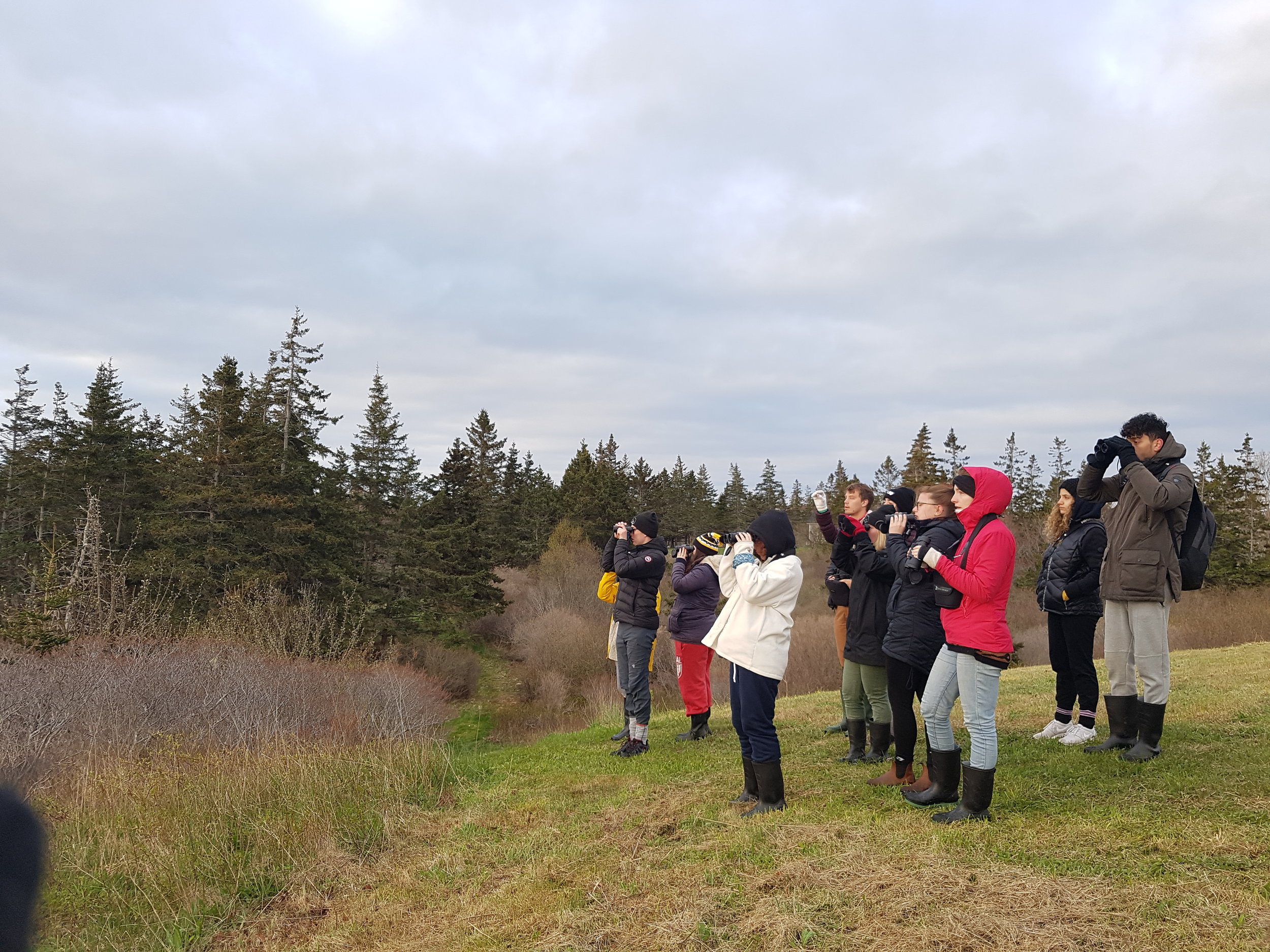Welcome back everyone to another summer of Friday Field Notes! We have a lot of notes to catch up on already!
This Spring we had a few research programs join us for an extended stay at the HLC
Through the Dalhousie SEASIDE program, Dr. Sarah Gutowsky led an ornithology course in May at the HLC. Ornithology is the study of birds, and this course was focused on aviation biology and population studies; specifically, identification of species by sight and sound. During their week long stay with us they identified 83 species of birds!! (pics of class) Sounds pretty cool right? Well you haven’t missed your chance to become a birder yourself. Dr. Gutowsky is leading a Birding-By-Ear public workshop from July 20-22 here at the Center! Visitors will stay overnight with us and learn the basics of identifying bird songs. For more information check out http://www.harrisonlewiscentre.org/weekend-workshops/birding-by-ear.
Dalhouse SEASIDE Ornithology students scouting for birds. Photo by Dr. Sarah Gutowsky.
There were two other SEASIDE courses hosted by the HLC this spring: Field Aquaculture and Medical Entomology. Aquaculture students were lucky enough to receive a visit from local aquaculture activists including some members of Friends of Liverpool Bay. The group engaged in an inclusive discussion about the impacts of open-pen aquaculture on coastal species and ecosystems. Later, one student was even luckier and spotted a black bear on the beach after dark—before the black bear spotted him! The Medical Entomology course, led by Dr. Tatiana Rossolimo, was only with us for one night—but in that time she and her students collected over 300 ticks for study!
Now in case you haven’t heard, the South Shore has a bit of a tick problem and this summer is no different. What is different is that over the past year we have been collaborating with a research team from Dalhousie University who are studying the tick population around the HLC. The study is led by Dr. Shelley Adamo and Dr. Tatiana Rossolimo, along with PhD candidate, Amal Nabbout. Last fall these researchers set up two test sites around the HLC, to gain insight into the overwinter survival rates of ticks. The study aims to determine whether there are certain factors that influence tick survival, particularly in the climate change era. The results from this study could become very important in developing strategies for controlling tick population growth! The team will continue to analyze their data through the summer and will be returning this fall for a second year of data collection.
Dr. Adamo gave us some helpful info to ease your mind and help you enjoy the outdoors this summer! First and foremost, not all ticks cause Lyme disease. There are two dominant tick species on Nova Scotia’s South Shore: The Dog Tick (Wood Tick) and the Black Legged Tick (Deer Tick). Only the latter carries Borrelia burgdorferi, the bacterium responsible for Lyme Disease, and only 3% of the population has been found to carry this bacterium. Luckily, the Deer Tick seems to be far less common in the area surrounding the HLC! To avoid tick bites, wear light clothing so its easier to spot them, spray a little repellent around your cuffs, tuck your pants into your socks, and frequently check when you’re out and about. Have a bug buddy to help you check those hard-to-see places like behind your ears! If a tick does get a nibble on you, worry not! Even if it is a Borrelia carrier, it takes 24 to 72 hours for any transmission to occur. For full information on what to do if a tick does bite please visit https://www.cdc.gov/lyme/removal/index.html.
A Dog Tick spotted on a nature walk through the HLC trails. Photo snapped by John Read!
If you’ve stuck with me this far you will be rewarded with info on all the fun programming we have on the go this summer.
First and Foremost, we are introducing Wild Weekends! Alternating Sunday guided hikes with Saturday workshops provide outdoor adventure every weekend from July to September. This summer has a wide array of programming focusing on environmental education, developing hands-on skills, and outdoor appreciation. You can check out the full schedule at http://www.harrisonlewiscentre.org/wild-weekend. Starting off the series is a Coastal Discovery Walk this Sunday (JULY 7th) with Izzy Clarke at White Point Beach from 11am-1pm. The guided hikes are FREE (a pretty good price if you ask me). Come on out and bolster your flora knowledge on a leisurely hike along the beautiful NS coastline.
We are also happy to announce our third year of N20: Never Too Old program! This program is designed for those 55+ that are interested in continuing their environmental education through hands-on experiences. However, anyone is able to join so bring your family along! This past Tuesday we had the lovely Cindy Hagen join us once again to lead an Eco-Printing workshop. She has been with us since the beginning of our N2O programming and is incredibly knowledgeable for artistry using found materials. We learned how to create beautiful designs on cloth by extracting the natural dyes of found flora through steam baths. It was a beautiful day to get out and get creative, and the results show just that! (pics from workshop)
Whew we made it! Thank you for coming along on this journey with me. All this stuff and the summer is just starting up!
Written by: Mackenzie Blanchard
Edited by: Shauna Doll




